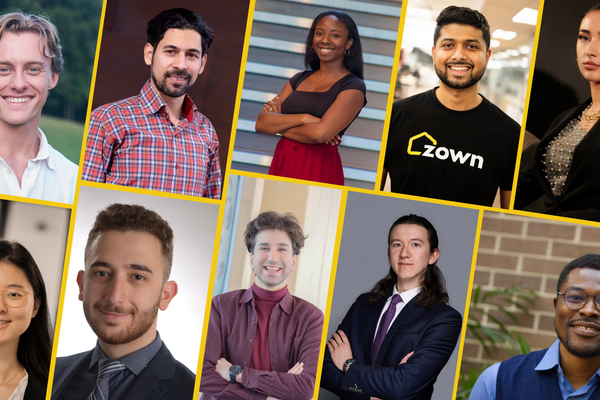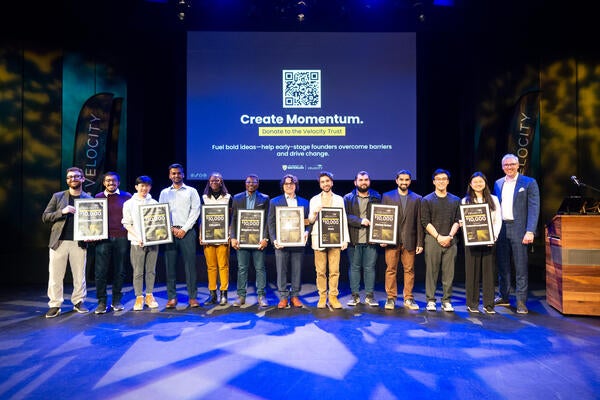
Four Waterloo-founded startups earn $2 million seed funding
From harnessing AI to revolutionizing mental health care, Waterloo students and alum continue to tackle big problems

From harnessing AI to revolutionizing mental health care, Waterloo students and alum continue to tackle big problems
By Mayuri Punithan Cheriton School of Computer ScienceThe University of Waterloo is well represented in the most recent cohort of companies accepted into the Y Combinator (YC), one of the biggest and most prestigious startup accelerators in the world.
Based in Silicon Valley, the YC hosts an annual program split into two cohorts that participate in the winter and spring. Successful applicants receive $500,000 in funding and other resources such as networking sessions, alumni talks and mentorship, particularly on finance, public relations, or product design. One of the most prominent events is Demo Day, where the cohort presents their startups to an audience of 1,500 investors and media figures, across two full days. Some notable YC alumni include Airbnb, DoorDash, Dropbox, Instacart, Reddit and Twitch.
With an average acceptance rate of three per cent, entry to the program is extremely competitive, and from an application pool of 27,000, only 260 companies were selected for the latest cohort.
Many startups from the winter 2024 have ties to the University of Waterloo: DraftAid and Attunement were founded by Engineering alumni while Datacurve and Blacksmith were founded by former and current students at the David R. Cheriton School of Computer Science.
Waterloo continues to nurture talent and empower aspiring entrepreneurs through innovative programs tailored for startups. These winning companies have the potential to shape our technological futures - learn more about four of the startups that received funding:

Attunement is the first remote monitoring platform specializing in behavioural health. Briar Smith (BASc ’20) is one of Attunement’s co-founders and Chief Technology Officer (CTO), who during his time at the University, also co-founded WATonomous, a student research team focused on developing and training autonomous self-driving vehicles. Over the years, WATonomous has received several awards and recognitions, including earning second place in the SAE AutoDrive Challenge, launched by General Motors and SAE International.
Blacksmith is a serverless computing provider that accelerates continuous integration (CI), a process where developers merge their code changes into a central location, by leveraging high-performance gaming central processing units (CPUs) and optimized software. Blacksmith’s co-founder Aditya Jayaprakash (BCS ’19) explains that with only a one-line code change, companies can use Blacksmith to run CI on platforms like GitHub Actions twice as fast while reducing their spending by 50 to 75 per cent compared to traditional cloud services. They plan to use their YC funding to support their hardware fleet and expand their engineering team.
Jayaprakash co-founded Blacksmith with fellow Computer Science alum Aayush Shah (BCS ’20) and Aditya Maru (BCS ’20). Their partnership traces back to the trio’s undergraduate days: Shah and Maru were friends from their first semester while Shah and Jayaprakash met during their co-op placement. “Co-op is the best part of being a Waterloo student. Multiple internships at different companies gave us all broad experiences and helped us become better engineers.” Maru says. “Apart from that, we all developed deep friendships, which we maintain to this day, even after almost 10 years,” Shah adds.

Large language models (LLMs) are AI programs that can recognize and generate text, just like a human. One of the most popular LLMs are chatboxes like ChatGPT. “For LLMs to work efficiently they must be trained on a lot of data so they can understand how the world works,” says Computer Science student Serena Ge, who together with her classmate Charley Lee, co-founded Datacurve to provide companies with high-quality data to enhance their LLMs.
For example, Datacurve can create data on back-end questions to train and improve a company’s model’s coding abilities. So far, Datacurve has raised $2.2 million in seed funding on top of their YC funding.
During her co-op term at the AI startup Cohere, Ge was responsible for enhancing LLMs’ reasoning capabilities. Recognizing then that many companies lack good-quality code data, she was inspired to co-create Datacurve. “Waterloo’s co-op program pushes you to think and act like an industry. This experience teaches you what is lacking in the landscape.” She believes Waterloo’s rigorous innovation and engineering ecosystem equips students with strong technical skills. “We were known in our YC batch to ship very fast.”
The co-founders were also involved with Velocity on campus through various events and programs.
Manually creating fabrication drawings from 3D models is time-consuming and prone to errors, demanding about 40 per cent of mechanical engineers' and designers' time. This detracts from more complex work and can cause significant delays in projects due to inaccuracies.
DraftAid's cutting-edge AI algorithms automate the 3D model to 2D production drawing process. It generates detailed 2D drawings with a single click, reducing hours to seconds and minimizing human error. It's the first AI specifically for CAD manufacturing drawings.

In addition to these four companies, several other startups in the winter 2024 YC cohort have connections to Waterloo including:
Double: A smarter investing account
Leaping: Automate bug resolution
Momentic: Automated software testing with AI
Nuanced: Detecting AI fraud, deepfakes, and misinformation
OffDeal: AI-native investment bank for buying SMBs
Swift: Instant deposit API for brokerages and digital banks
Tower: Using AI to help in-house counsels triage and manage incoming legal requests
The success of these Waterloo founders demonstrates the unique strength of Waterloo’s innovation ecosystem, where unmatched experiential education and exposure to leading entrepreneurship programs support students in developing a strong entrepreneurial mindset.

Read more
Here are the people and events behind some of this year’s most compelling Waterloo stories

Read more
From transforming solutions for homeownership to advancing health care interventions, Waterloo talent continues to disrupt industries and drive change

Read more
From non-invasive health care solutions to sustainable construction material and AI-driven coaching, the funding supports future-centric ventures
The University of Waterloo acknowledges that much of our work takes place on the traditional territory of the Neutral, Anishinaabeg, and Haudenosaunee peoples. Our main campus is situated on the Haldimand Tract, the land granted to the Six Nations that includes six miles on each side of the Grand River. Our active work toward reconciliation takes place across our campuses through research, learning, teaching, and community building, and is co-ordinated within the Office of Indigenous Relations.